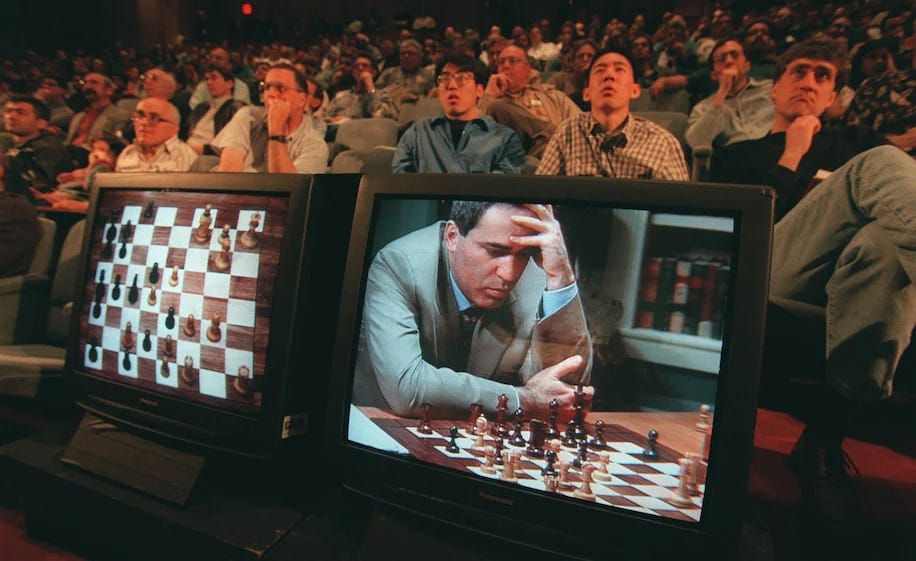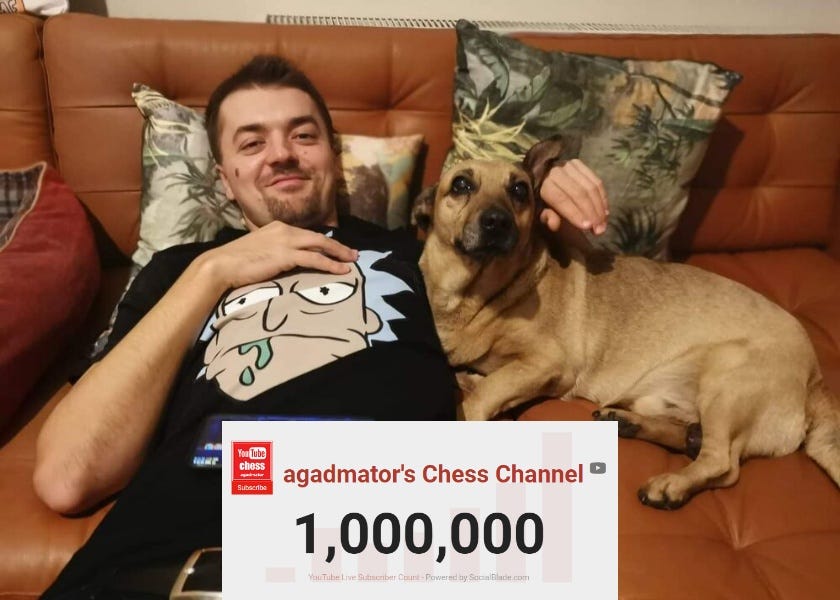That's the Good Stuff
The Work of My Life: January 2022 Report
“I had a lot of chess knowledge and I had no one to share it with.” – Antonio Radić
In May of 1997, a specialized computer built by IBM defeated the reigning world chess champion in a highly anticipated six-game match. Deep Blue’s 3½-2½ victory over Garry Kasparov capped a multi-decade long quest by the computer industry to conquer the Game of Kings. There was some controversy surrounding the match – Kasparov never was the most gracious loser – but it is generally agreed that Deep Blue’s accomplishment marked a significant milestone in the ultimate contest between human and machine.
In the following years, the particulars of the controversy were no match for the relentless exponential growth in computing power available to programmers, and it quickly became apparent that even the best human grandmasters would struggle to achieve a mere draw against dedicated machines. Many fretted that the proficiency of computers and their capacity for perfect play would mark the end of the world’s enchantment with chess.
Half a decade prior to Deep Blue’s historic victory, 5-year-old Antonio Radić was gifted a copy of Nintendo’s Legend of Zelda, the iconic video game that so many of us grew up playing. Unfortunately for the Croatian-born Radić, his copy was of the German variety and he was forced to play the game with a Croatian-German dictionary by his side. Despite having an International Federation of Chess (FIDE) Master as a grandfather, Radić rebuffed earnest attempts to have him follow a similar path, preferring instead to pass his time playing video games and watching English-language cartoons on the television. Kids will be kids, after all.
Fast forward a decade. Computers were regularly trouncing all human chess players and 16-year-old Radić discovered a deep passion for the game, beginning a most unlikely journey to the top of the chess world. Although Radić is an above average player – his FIDE rating currently sits at 1,950 – it isn’t his playing that makes him a household name among chess enthusiasts. Instead, Radić is one of the most recognizable faces in chess because he created agadmator’s Chess Channel, a YouTube property with a staggering 1.21 million subscribers and over 553 million total views.
Radić is pursuing the work of his life. With his trusty dog Medo by his side, Radić publishes quality videos with accessible insights and in-the-know humor on a daily basis (having published nearly 2,600 videos since he started covering chess in 2017). His catch phrases have infiltrated the chess world’s vernacular, starting with his charismatic “Hello everyone!” at the beginning of most videos to “Captures, captures,” and our personal favorite “That’s the good stuff.” This brilliantly funny 72-second video of Radić playing bullet chess against a fan should give you a sense of his style and charisma:
The popularity of chess has not waned with technology’s ability to play with perfection. On the contrary, the game has continued to explode in popularity worldwide. Why? The answer is simple. The drama of watching humans play chess imperfectly is irresistible, the exact opposite of boring, computed perfection. Time controls. Blunders. Personalities. Wins. Losses. Draws. Standings. Candidate matches. Child prodigies. Cagey veterans. Controversies. Pressure. Euphoria. Despair. The soulful contour of the human endeavor is what drives the popularity of chess, and Radić’s own unlikely journey and undeniable passion are infectious.
We believe the same phenomenon is unfolding in the written medium. It is hard not to be overwhelmed with the clickbait-posing-as-news that pollutes virtually every high-traffic website and social media platform on the internet today. Churned out by computer algorithms optimized to trick people into staring at whatever targeted advertisement awaits, the written word has been reduced to just another empty commodity. Newsrooms have been hollowed. What remain are organizations incentivized to stoke division with pseudo-controversies and half-told news.
With Doomberg, we are proud to be swimming against this powerful current. While we expect that readers might not agree with everything we publish, our focus on quality writing, cited research, crisp visuals, and tight editing continues to attract genuine engagement that has catalyzed growth far exceeding what we thought possible when we embarked on this life-changing adventure nine short months ago.
January was another spectacular month for us. We set new records for absolute growth in views, email subscribers, and Twitter followers. The seven articles we published in the month have averaged 85,000 views, and our most widely-read piece – Dollars Ex Machina – is approaching 110,000. Our email open rates regularly exceed 60%.
Here are the statistics as of January 31, 2022, along with a chart that documents our month-over-month growth across these key metrics:
Articles published: 85
Total views: 2,415,895 (+40%)
Email subscribers: 27,743 (+36%)
Twitter followers: 37,225 (+34%)
We believe a key part of our success is our willingness to promote other aspiring independent writers and content creators. We do this by highlighting, building on, and linking to great work in our own pieces, retweeting material on Twitter, and freely exchanging tips and best practices for growing an audience in private conversations and direct messages. Our belief is that the rising tide lifts all boats, and the exponential growth in demand for good content means there’s more than enough audience for everybody who puts serious effort behind their work. We’re playing a positive-sum game.
We borrow this philosophy of giving from our good friend and mentor Grant Williams, and it’s for this reason that we are especially proud to announce that Williams has invited us to be a co-host of a new podcast called This Week in Doom. Although the podcast will reside behind his paywall, the first episode of the show is available free to all listeners here. Our collaborative intent is to use this series to highlight great content creators, often operating under the radar, that represent valuable resources across a variety of meaningful topics. This will be an excellent project.
We close with a reminder that if you enjoy reading Doomberg, please do us the huge favor of simply pressing the like button. If you read us regularly and haven’t already done so, consider signing up with your email so you’ll never miss one of our pieces. Head over to Twitter and follow us @DoombergT – we publish many morsels of original content on that platform, and it is a significant driver of our growth. Doing these simple things costs you nothing, means the world to us, and sends the following message to the market:
Doomberg? That’s the good stuff.






I don't want to perpetuate the division that is rampant in American today, but I don't think I can be friends with the near 40% of people who don't open emails from Doomberg:)
At 73, I have had a lifetime of exposure to fakers and posers. It is wonderful to see platforms such as yours rising from the chaos. Somewhat akin to the phoenix.